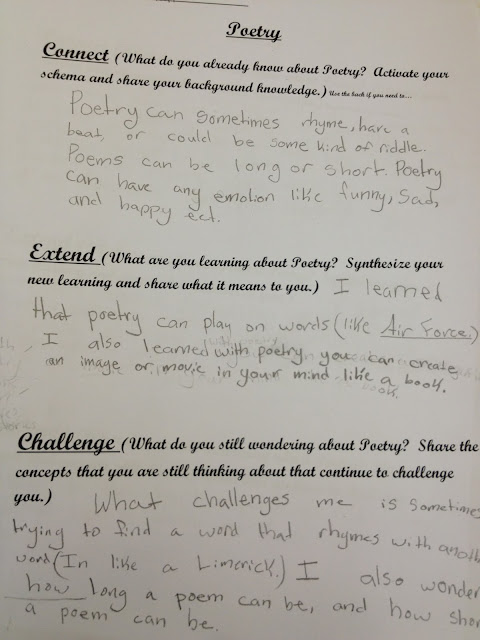Connect Extend Challenge
What we did: After our study of Poetry, third and fourth graders used the Connect Extend Challenge routine. It provided us the opportunity to share background knowledge, capture new learning and ponder further study.
Connect: At Bill Roberts, we teach literacy through genre studies. It is based on the Denver Literacy Plan and we spiral learning from year to year, so I knew that our students have had the opportunity to dive into poetry already. As a best practice, spiraling is appropriate as students develop and access deeper understandings and concepts, but the challenge is to make the genre new and interesting each year. The thinking routine of Connect, Extend, Challenge helped me to assess what they knew before the study and to assess their growing understandings.
Extend: I had a lot of realizations from using this thinking routine as an assessment. Often, my assessments are formative as we chart our learning each day, create writing, discuss, use daily exit slips, etc., but I don't often do a summative assessment in the form of a "quiz". There was power in doing this routine at the end of our study. I feel confident that I know the enduring understandings that students took away from our work. Students stated thinking such as, "Words sound different when you articulate and that helps create sensory images. Poetry can help us wonder. You can pause and let it speak to you. Poetry can tell stories, be humorous, have invented words, and change your mood. Poetry can play on words. It can represent your true nature. One phrase can fill your mind with an image." WOW! I am also interested in their challenges. One student wrote, "How does poetry affect our lives? Can it change our lives?", though most wonderings were not as profound.
Challenge: It is the area of challenge that I want to continue to pursue with my students. This component of the thinking routine will help my students to be lifelong learners. It is interesting that as I use this thinking routine in my own professional development, it is often this last piece that I find difficult. Students asked questions such as, "When did people start writing poetry? How old is it? Who invented it? How long can a poem be?" I am not sure what I am looking for, but we are on the right track!




Val, I hadn't thought of using this routine as a summative evaluation. I am inspired! Knowing that you have used this and other routines will aid me in the future when we again share students. :-)
ReplyDeleteThis is a great idea Val. Like Kim, I never would have thought to use this as a summative assessment, but it sounds like you gleaned a lot of great information from them. Of course it's always pleasing to see all that the kids learned throughout a unit, but their challenges were the most interesting to me. Oftentimes I think I forget to slow down, and discuss what we're still wondering about. I'm interested in trying this routine in the future. Thanks!
ReplyDeletewhat are some disadvantages of this teaching strategy
ReplyDelete